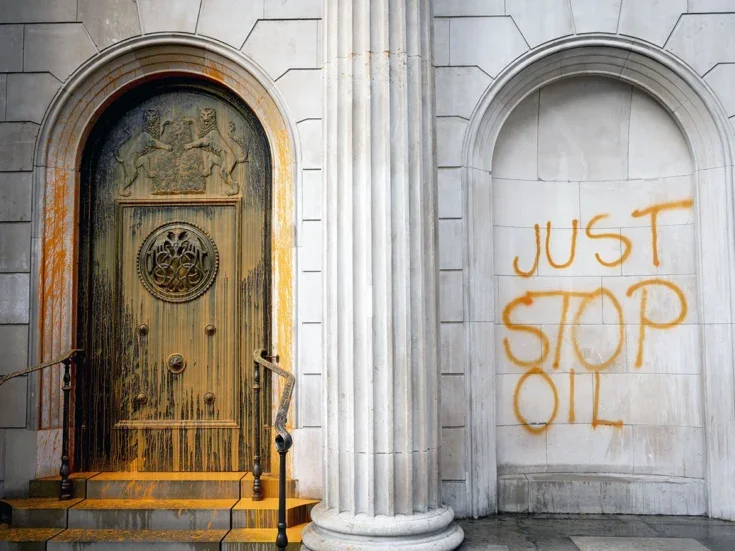
2017 wasn’t quite the disaster that many expected it to be, writes Christopher Jackson
Any year spent on planet Earth is liable to be somewhat mixed. The forces of disruption and difficulty can be betted upon to be reasonably active, and at Christmas time Joseph Mohr’s idea of a world where ‘Alles schläft; einsam wacht’ [‘all is silent, all is bright’] can seem permanently on hold.
But if you can peer past the chaotic headlines and the preposterous tweets, 2017 wasn’t quite so bad as all that – and certainly not so bad as 2016 made you fear it might be. It was rather like one of those Magic Eye posters where the more you look at it, another picture emerges. That’s partly because 2016 was meant to be the end of the world, and any Armageddon narrative must ultimately answer to the awkward fact of the sun’s having risen. ‘The worst is not so long as we can say “This is the worst”,’ as Lear has it.
In fact, 2017 wasn’t so much the year of Trump or Brexit as #metoo. From Harvey Weinstein and Kevin Spacey, to Pestminster, by way of Charlie Rose and Mark Halperin, the year was dominated by a much-needed shift in society. Perhaps it was put best by Rose himself in an otherwise inadequate apology: the world came into ‘a profound new respect for women and their lives’. It was a shocking revelation, but it opened up onto salutary change. Suddenly, the old dream – which we partly owe to Christmas – came true: the first were last, and the last were first.
As the sleazy masculine order fell, it was possible to note that there were specific limits placed on the so-called Great Reckoning: it has stopped, for the time being, at the doors of the Oval Office.
But when it comes to the wider shadiness of Donald Trump’s presidency, there are silver linings. One is the sheer ineffectiveness of the 45th president. The radical things he wishes to do remain difficult to accomplish outside the confines of a senile imagination: the consensus on climate change, hard-won in the Obama era, remains intact across 195 nations; the wall on the Mexican border is unbuilt, and is so far a mere mental construct, as airy as that US embassy in Jerusalem. Meanwhile, in the more consequential realm of reality, Robert Mueller continues to appear promisingly sleuth-like in relation to the 2016 Trump campaign’s ties with Russia. Mueller seems the sort of man who eventually gets at truth – which is what America, and the world deserves.
Further, in the instance when Trump has accomplished meaningful legislation, it hasn’t been wholly to the bad. Most commentators accept that the Tax Cuts and Jobs Act at least accomplishes a reduction in the corporate tax rate from 35 per cent (the third highest in the world) to 21. Though it isn’t clear precisely what savaging the Obamacare individual mandate will achieve besides a rise in insurance premiums, there may be accidental benefits for other countries to the overall legislation: given the expected increase to trade deficits that will result from the bill, the likely beneficiaries will be foreign investors, and not the typical Virginian coal-miner who voted Trump in. Short-term at least, those are problems for Trump and not the world.
HOME FRONT
In the UK too, the prime minister Theresa May’s disastrous snap election was likely more of a disaster for the Conservative party than for the country at large. May’s initial out-of-the-customs-union, out-of-the-single-market interpretation of a narrow 52-48 per cent referendum vote always looked a stretch: with a folly that can still make one smile she tested that mandate, expecting a bigger one, and received a smaller.
For all who care about Britain’s continued access to its biggest export market, the result not only strengthened the hand of the business-friendly chancellor Philip Hammond, it also stopped short of delivering a retro Jeremy Corbyn government. The June result was not only good for democracy, it can also be seen as a kind of best of both worlds for the fiscally-minded: the liberal settlement threading an impossible course between Scylla and Charybdis. Meanwhile, with the Irish question having been resolved (in theory) in favour of a fluid border, the odds are swinging towards a half-sensible solution – always assuming May can hold her administration together. Her want of charisma – and the nagging sense that she has never really known her own mind – makes her hardly a shoo-in there.
But there are other stabilising factors in global politics. In spite of much tedious posturing, there’s been no war with North Korea – yet. Although Xi Jinping has Maoistically written himself into China’s constitution, China continues to keep its climate change obligations, and has also done £55 billion of trade with the UK.
ISIS’ last fighters have negotiated to leave Raqqa; without any fanfare, the caliphate has been quietly cancelled. And while the UK saw terror attacks in Manchester and London whose cruelty can never be undone, the Western way of life remains far more durable than the random acts of murder they are able to perpetrate.
Meanwhile, Angela Merkel – despite her struggles to form a coalition – is hanging on for now, an example of becalming moderation in a hectic world. Emmanuel Macron, in spite of his current travails in the polls, remains an intelligent and interesting voice in Europe, and one who, as a former employee of Rothschild, has a decent working knowledge of economics. And better Macron, for all his slightly alarming self-assurance, than Marine le Pen with her very alarming opinions.
Some of the prevailing optimism is reflected in the mood economically. Markus Stadlmann, chief investment officer at Lloyds Private Bank, said: ‘In a year with so much uncertainty and strong performance by equity markets across the globe, it’s intriguing to see that UK investors feel more optimistic now than they did this time last year.’ Emerging markets remained a big success story, and though there are fears that the wealth management industry will be hit badly by MiFID II when it’s introduced in the New Year, most managers were pleased with the performance of particular asset classes – most notably gold (which rose from $36,500 per kilogram to over $40,000 during the year), as well as US and Japanese shares.
It is true that there are worrying indicators in respect of the property market with investment confidence dropping from 25.3 per cent in December 2016 to 14.2 per cent this month. And Hammond’s winter budget was very wintry indeed predicting slow growth into the future. Even so, unemployment remains cheeringly low at 4.2 per cent, and there is also the possibility that December’s phase one agreement can be built upon even-handedly, and that over time, sluggish forecasts can be revised upwards. Meanwhile, the FTSE has grown steadily from 7,178.50 at the start of the year to its present position of 7,558.48.
Of course, healthy share prices also draw one’s attention to the perennial problem in our society: inequality. On the one hand we have a rarefied world of sophisticated trading and investment in alternative assets. Bitcoin began trading on the Chicago Board Options exchange in December 2017, and its price is up 1,550 per cent this year, with one bitcoin currently worth £13,774. You’d still need quite a lot of those to purchase Leonardo’s ‘Salvator Mundi’ though, which sold for $450 million, although it would cover a half-smoked cigar of Winston Churchill’s, which sold at Boston-based RR Auction for $9,000.
GRENFELL TRAGEDY
On the other hand, we had the unforgettable tragedy of Grenfell Tower, which drew attention to the plight of the poor in the most expensive postal district in the country. It was easy to think of the burning tower as a symbol of a nation’s divisions. But perhaps that was too easy: it was a catastrophe, not a sign. And in any case, where May, a vicar’s daughter, failed to show the right compassion it was up to a King’s daughter to do what her first minister couldn’t, and provide the correct measure of empathy when grief was at its sharpest. Perhaps she has simply had more practice at it.
It was a good year for the Royal Family. The Duke and Duchess of Cambridge announced in September 2017 that they are expecting their third child, and Princess Charlotte – to the general delight of all – will begin nursery in January. But of course, the big news of the year was that Prince Harry became engaged to Meghan Markle. Markle immediately quit acting, perhaps drawing attention to a lack of true commitment to her art. But those who have watched Harry from afar, and seen him convert personal grief into a high-spirited individuality rare for a royal, could only be happy for him.
In other respects, politics and royals can seem ancillary to entertainment and culture. In a thousand box sets, and books and shows, the human imagination is thriving, and a certain strain of corrective fantasy appeared in the world’s art: LaLa Land made us want to tap-dance in the LA sunshine; Larry David gave us a cathartic season of Curb Your Enthusiasm; Philip Pullman returned to Dust.
In sport, though Usain Bolt was shown to be mortal in London running a 100 metres too many, the Jamaican sprinter also proved himself for all time a man of class in the way in which he dealt with defeat. The ageless Roger Federer took two more major titles, taking him to 19; as did the remarkable Rafael Nadal, who has 16. The Ashes were lost, but they deserved to be lost – and we’ll win them back next time.
So all is not silent, and all isn’t bright. But at Christmas one is inclined to think optimistically: the curious image of the boy in the manger, and the star in the sky. Trump’s predecessor used to call it hope, and he implied that it shouldn’t be subject to fashion. Happy Christmas.
Christopher Jackson is head of the Spear’s Research Unit











